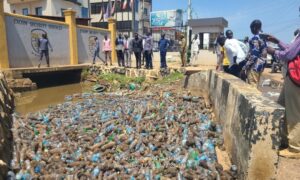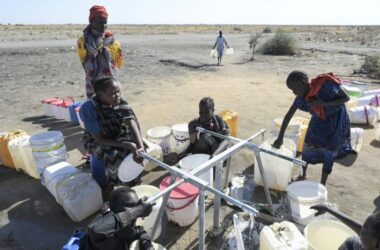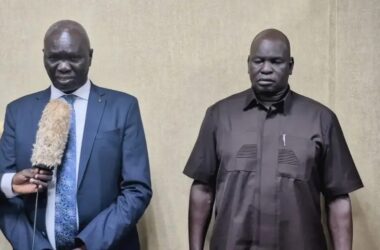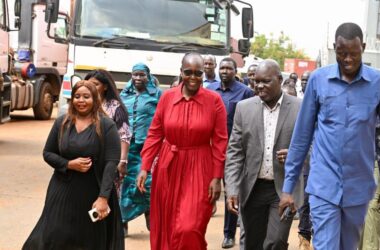
By Kei Emmanuel Duku
South Sudan is facing a severe environmental crisis, having become a “dumping ground” for unrecyclable waste from neighbouring East African countries, according to Peter Makuei Har, a prominent legal advisor for the South Sudan Council of Churches (SSCC).
Har made his remarks at the conclusion of a two-day climate change workshop aimed at religious leaders.
The workshop, titled “Enabling Meaningful Participation of Citizens in Climate Change Policy Legislation and Climate Advocacy in Central and Eastern Equatoria State,” brought together over 30 participants from various churches across the country.
Har stated that the imported goods, while intended for business, are creating a major hazard due to the country’s lack of a proper waste management and recycling system. This has led to far-reaching consequences, including public health issues and damage to agriculture and infrastructure.
He further said the influx of plastic waste has clogged drainage systems, creating stagnant water and breeding grounds for mosquitoes, which has led to a rise in malaria. The problem is exacerbated by poor infrastructure, as many roads lack adequate drainage, causing rainwater to flood homes and communities.
Har also shared an informal experiment from 2015 that points to a potential solution for plastic recycling.
“By mixing plastic with sand, I created a composite material that proved more durable than a standard brick. This suggests that recycled plastic could be used as a sustainable building material, offering a way to both reduce waste and create new opportunities for construction” said Har.
He stated that the current practice of burning plastic waste is also causing significant harm by releasing toxic fumes that can lead to respiratory illnesses like pneumonia and heart disease.
Despite the dire situation, there is hope. A recent cleanup initiative by youth in Juba, who collected plastic and other waste from the streets, shows the power of citizen action. Har emphasized that while government involvement is crucial, the responsibility for waste management also falls on the public. He said, “When they see the citizens are doing their work, the government will be forced to follow.”
A proposed environmental management bill is currently stalled in parliament, reportedly due to opposition from stakeholders with conflicting business interests, such as those involved in the charcoal trade. Proponents of the bill hope it will eventually become law to regulate waste disposal, plastic management, and water management.
Beyond plastic, South Sudan is also struggling with abandoned and rusty metals, including damaged vehicles from years of conflict.
The legal advocate suggested that the country needs to invest in recycling equipment and factories to process these materials, turning these hazardous materials into more proactive venture. a resource.
He stressed the need for collective effort, with citizens that can lead tocharge and the government providing a supportive framework, is the only way forward.
Khemis Abbaiz, a church representative, spoke with a heavy heart about the environmental changes he has witnessed. He lamented the loss of wetlands and the rampant disposal of plastic bottles and bags, which end up in the Nile River. He also pointed out that hotels and residential areas are directing sewage directly into the river, further polluting the environment.
Abbaiz noted that Juba, once a small city, now has thousands of cars producing fumes that harm public health. He urged citizens to change their mindset. “Let us change our attitude,” he said.
He described the workshop as a catalyst for change, stating, “Workshops like this are going to make us like helicopters for change.”
Abbaiz also expressed concern over deforestation, which he linked to economic problems and the depletion of woodlands. He explained how this could lead to more severe climate problems, emphasizing the importance of forests rainfall formation.
He highlighted a need for collaboration between churches, the government, and NGOs to address climate issues. He noted that climate change affects everyone, regardless of their status, citing last year’s temperature in Juba, which reached nearly 50 degrees Celsius.
Abbaiz criticized Juba’s poor urban planning, which allows development to disrupt the natural environment without mitigation strategies. He called on the government to prioritize environmental issues in its planning and to preserve the environment for future generations.
As a special Executive Board Member of the SSCC, he advocated for the council to lead this change, saying, “We, as churches and faith-based groups, can take a lead in making sure that the environment is protected and managed well.”
He urged leaders to work together to change people’s attitudes and to maintain a healthy environment, which he called a shared responsibility.
Whereas, Wani Stephen, Executive Director of the African Democracy and Resilient Network, asserted that a strong collaboration between faith-based institutions, civil society, and the government is essential for South Sudan to effectively combat climate change.
He highlighted the pivotal role of religious organizations, particularly the SSCC, due to their extensive following.
Stephen stressed that religious organizations have a significant platform to amplify the voices of the people, advocate for policy changes, and lobby for crucial finances. He explained that this collaboration aims to align national efforts with global objectives, which include reducing carbon emissions, addressing climate change impacts, and supporting vulnerable communities.
He referenced the South Sudan National Determined Contributions (NDC), which outlines the government’s priorities across various sectors, and urged for a united effort to pass pending legislation like the Environmental, Water, and Land Bills.
“Climate change is a developmental issue,” Stephen said. He called for “climate governance” to be a critical part of the national agenda and suggested that the upcoming financial bill should allocate resources to address climate vulnerability, including food security, education, renewable energy, and infrastructure.



